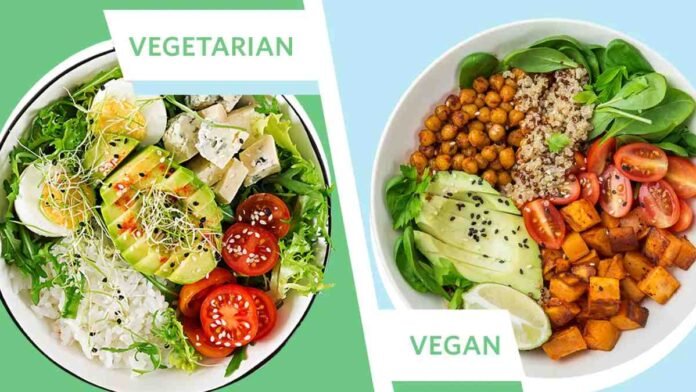All vegans are vegetarian but all vegetarians are not vegan. If you are getting confused with this statement then you should read this article carefully as it explains the difference between vegan vs vegetarian lifestyles. As plant-based diets continue to rise in popularity, understanding the above concepts has become more important than ever in 2024.
Most people get confused while talking about vegan vs vegetarian diets. Both diets are often grouped, but they have distinct differences that reflect varying commitments to animal welfare, health, religion, and environmental sustainability.
A vegetarian diet focuses mainly on plant-based foods. They do not consume meat, poultry, or fish, animal protein like rennet, or gelatin but they may typically include animal by-products such as dairy, eggs, and honey in their diet. Vegetarian lifestyle is somewhat more flexible and easier to maintain, especially for those transitioning to a plant-based way of life. There are several variations of the vegetarian diet, each offering flexibility based on dietary preferences.
Vegans, on the other hand, are a stricter form of vegetarianism. Those who are on a vegan diet focus exclusively on plant-based foods and do not consume any animal-derived products like dairy, eggs, honey, and any other items that derive from animal products. Vegans even prohibit using any product that directly or indirectly involves the human use of animals such as leather and silk in their lifestyles.
Are the Health Benefits of Vegan and Vegetarian Diets the Same?
Both Vegan and Vegetarianism offer health benefits as they are rich in plant-based foods like fruits, vegetables, whole grains, and legumes. Both diets contain a high number of nutrient-dense foods. Consumption of such dietary elements improves digestion and promotes weight management. Yet, there are some differences between these diets due to the inclusion of animal products in vegetarian diets. For example, insufficient intake of nutrients such as iron, calcium, vitamins D, B12 and long-chain omega-3 fatty acids in vegan diet may lead to a negative impact on various aspects of health, including mental and physical health. Vegetarians who consume dairy and eggs may have easier access to nutrients like vitamin B12 and calcium.
Studies show that a Vegan diet is linked to even greater health benefits, such as lower cholesterol, lower risk of developing type 2 diabetes, heart disease, certain cancers, and a reduced carbon footprint.
Whether you choose veganism or vegetarianism, both offer meaningful ways to contribute to a healthier planet and lifestyle.



